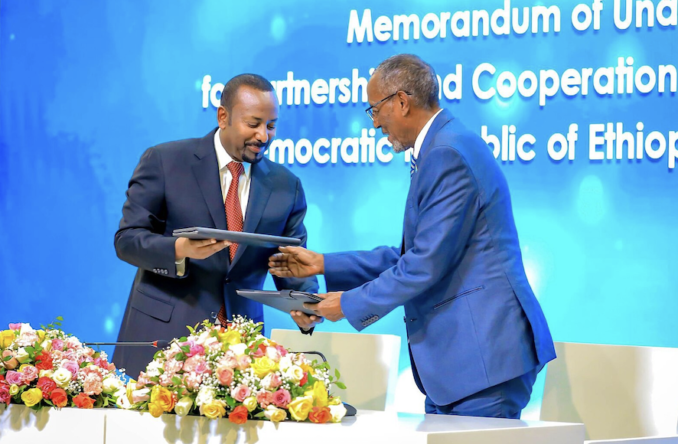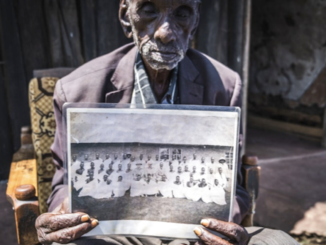
President of Somaliland and the Prime Minister of Ethiopia signed a Memorandum of Understanding,
Office of the President of Somaliland – Public domain
The US decided to expand its military influence in Somalia on the pretext of anti-terrorist base-building in order to indirectly pressure Ethiopia after last month’s Memorandum of Understanding with Somaliland in a “plausibly deniable” way.
America and Somalia are celebrating the recent clinching of a deal whereby the first will build five bases in the second ahead of the African Union scaling back its peacekeeping presence there. This agreement is being presented as supposed proof of their joint anti-terrorist intentions, which would be worthy of praise if only there weren’t credible reasons to suspect ulterior motives. The timing not only coincides with those peacekeepers’ impending withdrawal, but also with another major regional development.
The Memorandum of Understanding (MoU) that Ethiopia and Somaliland signed on the first day of the year provoked a meltdown in Mogadishu, whose UN trained and US proxy leader then travelled to Eritrea and Egypt in an attempt to recruit allies for the hybrid war that he’s plotting against his country’s two neighbours. This prompted fears of a regional war breaking out, even if only by miscalculation, and it’s within this tense context that the US is doubling down on its military support for Somalia and reminding their proxy leader who is being controlled.
American-Ethiopian relations were complicated by the 2022 Northern Conflict due to the serious reality that Washington supported the TPLF as part of a plot to punish Addis for its multipolar foreign policy. While ties have since improved, at least on the surface, it would be premature to claim that there isn’t any lingering mutual distrust. From the perspective of some in Ethiopia, the US simply changed the means through which it sought to contain their country but never abandoned that hegemonic policy.
From an outsider’s perspective, the Afghan precedent doesn’t inspire confidence either since two decades’ worth of training and US$2 trillion worth of total costs weren’t enough to prevent the Taliban from returning to power, so it’s doubtful that a proverbial drop in the bucket will stop Al-Shabaab. While some anti-terrorist aid is always better than none at all, the US’ historical neglect of Somalia’s security interests makes one wonder why it’s inexplicably prioritizing them at this particular time all of a sudden.
It’s also noteworthy that Eritrean trolls and that country’s other agents of influence on social media aren’t screeching about this deal despite their leader Isaias Afwerki articulating an indisputably anti-American worldview while meeting with his Russian counterpart last summer. Their country is pathologically obsessed with containing Ethiopia, however, and this policy imperative takes precedence over commitment to their alleged anti-imperialist principles if forced to choose between these two.
Those accounts’ refusal to condemn Somalia for cutting such a major deal with the so-called devil in clear contradiction of their leader’s worldview suggests that they’re aware of its ulterior anti-Ethiopian motives in the larger regional context and predictably support them enough to not raise a stink. After all, it’s self-discrediting for them to remain silent about their enemy building five bases in their partner’s country while raging against the MoU, which exposes their hypocrisy and intentions to contain Ethiopia.
What appears to be happening is that the US decided to expand its military influence in Somalia on the pretext of anti-terrorist base-building in order to indirectly pressure Ethiopia after last month’s MoU with Somaliland in a “plausibly deniable” way. The way in which this latent threat could manifest itself is if those bases that it’s building and troops that it’s training there are one day used to wage hybrid or conventional war against Ethiopia and/or Somaliland instead of fight Al-Shabaab.
For that to happen, however, Somalia would likely require Eritrea to participate in at least an advisory role and for their shared Egyptian ally to partially bankroll the operation. Neither has made any moves in those directions, at least according to publicly available information, but it’s still too early to rule out this scenario entirely. As it stands, American base-building and troop training might bolster the capabilities of the Somalian Armed Forces, which could then encourage Eritrea and Egypt to play these envisaged roles.
© Andrew Korybko 2024, reproduced with permission
AW Kamau 2024



